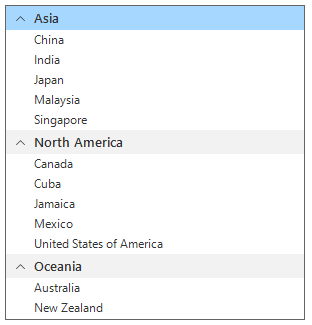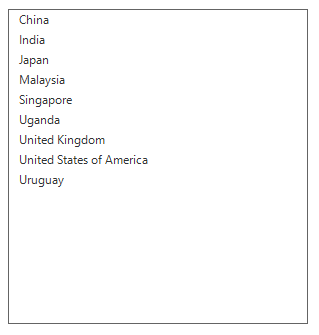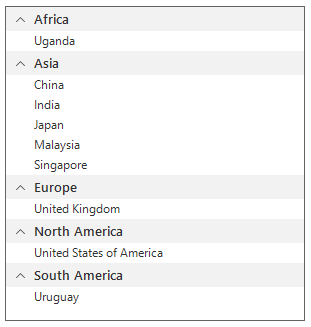How can I help you?
Filtering in Windows Forms ListView
9 Oct 20236 minutes to read
This section explains how to filter the data and its related operations in the SfListView.
Programmatic Filtering
The SfListView supports to filter the data by setting the SfListView.View.Filter property. You have to call the SfListView.View.RefreshFilter() method after assigning the Filter Property for refreshing the view.
The FilterChanged event is raised once filtering is applied to the SfListView.
listView.View.Filter = CustomFilter;
listView.View.RefreshFilter();
public bool CustomFilter(object obj)
{
if ((obj as CountryInfo).Continent == "Asia" || (obj as CountryInfo).Continent == "North America" || (obj as CountryInfo).Continent == "Oceania")
return true;
return false;
}listView.View.Filter = AddressOf CustomFilter
listView.View.RefreshFilter()
public Boolean CustomFilter(Object obj)
If (TryCast(obj, CountryInfo)).Continent = "Asia" OrElse (TryCast(obj, CountryInfo)).Continent = "North America" OrElse (TryCast(obj, CountryInfo)).Continent = "Oceania" Then
Return True
End If
Return False
Filter based on multiple criteria
The SfListView allows filtering the items based on multiple criteria.
sfListView1.View.Filter = FilterOnMultipleCriteria;
sfListView1.View.RefreshFilter();
public bool FilterOnMultipleCriteria (object obj)
{
if ((obj as CountryInfo).Continent == "Asia" || (obj as CountryInfo).CountryName[0].ToString().Equals("U"))
return true;
return false;
}sfListView1.View.Filter = AddressOf FilterOnMultipleCriteria
sfListView1.View.RefreshFilter()
public Boolean FilterOnMultipleCriteria (Object obj)
If (TryCast(obj, CountryInfo)).Continent = "Asia" OrElse (TryCast(obj, CountryInfo)).CountryName(0).ToString().Equals("U") Then
Return True
End If
Return False
Getting the filtered data
You can get the filtered items from the view and modify it in the SfListView.View.FilterChanged event. When filter is applied, the filtered items are available in the SfListView.View.DisplayItems.
sfListView1.View.FilterChanged += new NotifyCollectionChangedEventHandler(View_FilterChanged);
private void View_FilterChanged(object sender, NotifyCollectionChangedEventArgs e)
{
ObservableCollection<object> country = new ObservableCollection<object>();
var items = (sender as DataSource).DisplayItems;
foreach (var item in items)
country.Add(item);
}AddHandler sfListView1.View.FilterChanged, AddressOf View_FilterChanged
Private Sub View_FilterChanged(ByVal sender As Object, ByVal e As NotifyCollectionChangedEventArgs)
Dim country As New ObservableCollection(Of Object)()
Dim items = (TryCast(sender, DataSource)).DisplayItems
For Each item In items
country.Add(item)
Next item
End SubClear filtering
The SfListView allows clearing the filters by setting the View.Filter to null and call the View.RefreshFilter method.
sfListView1.View.Filter = null;
sfListView1.View.RefreshFilter();sfListView1.View.Filter = null
sfListView1.View.RefreshFilter()Sort the filtered items
Order of the filtered items can be rearranged in the FilterChanged event by adding SortDescriptor.
sfListView1.View.FilterChanged += new NotifyCollectionChangedEventHandler(View_FilterChanged);
private void View_FilterChanged(object sender, NotifyCollectionChangedEventArgs e)
{
sfListView1.View.GroupDescriptors.Add(new GroupDescriptor()
{
PropertyName = "Continent",
});
sfListView1.View.SortDescriptors.Add(new SortDescriptor()
{
PropertyName = "Continent",
Direction = Syncfusion.DataSource.ListSortDirection.Ascending,
});
}AddHandler sfListView1.View.FilterChanged, AddressOf View_FilterChanged
Private Sub View_FilterChanged(ByVal sender As Object, ByVal e As NotifyCollectionChangedEventArgs)
Private Function Syncfusion.DataSource.GroupDescriptor() As sfListView1.View.GroupDescriptors.Add(Shadows
.PropertyName = "Continent"
End Function
)
Private Function Syncfusion.DataSource.SortDescriptors() As sfListView1.View.SortDescriptors.Add(Shadows
.PropertyName = "Continent",
.Direction = Syncfusion.DataSource.ListSortDirection.Ascending,
End Function
)
End Sub